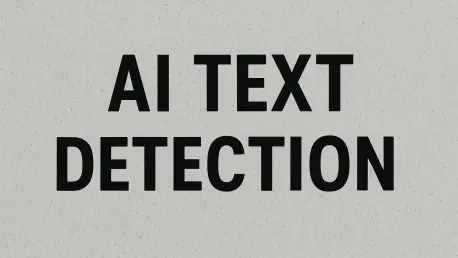Imagine a groundbreaking AI technology designed to enhance fairness in academic publishing, only to discover it inadvertently reinforces existing inequalities. This paradox sits at the heart of AI text detection’s growing significance across industries, spotlighting an urgent need to examine biased outcomes. With tools like GPTZero emerging in fields like academia and publishing, detecting AI-generated content reliably is paramount. However, biases within these systems have a profound impact, particularly on non-native English speakers, raising concerns about fairness, inclusivity, and accuracy.
The Expansion of AI Text Detection
Rising Adoption and Growth
In recent years, AI text detection usage has surged across sectors, becoming indispensable in academia, publishing, and beyond. Data from leading market reports highlights technological advancements driving its adoption, with organizations seeking to safeguard integrity by differentiating human from AI-generated content. The increasingly sophisticated capabilities of tools like GPTZero illustrate the transition from novelty to necessity, underscoring AI’s expanding role in streamlining processes, ensuring compliance, and protecting intellectual property.
Real-World Applications and Notable Case Studies
Academic institutions and publishing houses have been at the forefront, employing AI detection tools to authenticate manuscripts and research papers. This technology is crucial in preventing plagiarism and ensuring the originality of scholarly work. However, a recent study showcased troubling discrepancies. In some instances, non-native English authors found their legitimate work misclassified as AI-generated, revealing significant challenges within detection systems. These discrepancies compel a reevaluation of the technology’s effectiveness, shedding light on areas requiring improvement for equitable usage.
Understanding Bias in AI Text Detection
Industry experts identify inherent biases as a pressing issue within AI detection. Reflecting on these biases’ implications, it becomes evident that non-native English speakers face disproportionate hurdles. Misclassifications can jeopardize entire careers, as false positives lead to unwarranted scrutiny or rejection of legitimate work. This bias poses significant threats to fairness, limiting diverse voices in academic discourse and affecting content creation across numerous settings. These concerns reinforce calls for responsible AI development and transparency in text detection algorithms.
Looking Ahead: The Future of AI Text Detection
Projecting into the future, advancements in AI text detection promise transformative changes. Potential benefits include increased accuracy, enhanced functionality, and ethical improvements offering more equitable access across different industries. As researchers advocate for ethical use of large language models, the future outlook emphasizes overcoming current limitations by developing more inclusive and fair AI systems. The continuous evolution of AI hints at overcoming biases, potentially paving the way toward more honest platforms encouraging broad participation.
Conclusion and Path Forward
To address the biases in AI text detection, researchers and industry leaders highlighted its crucial implications on equity, emphasizing the importance of transparency and fairness. The exploration of biases’ impacts revealed substantial challenges, prompting heightened awareness and proactive measures to counteract disparities. As AI evolves, stakeholders recognized the need for concerted efforts to implement improvements, aiming to foster inclusive environments, ensure equitable technology applications, and reinforce diverse contributions. Moving forward, the emphasis shifted toward refining AI detection systems, aligning technological innovation with ethical practices, thus catalyzing a fairer landscape in academia and beyond.









